Stricter biosecurity for gamebird keepers as flu cases spike
 © Tim Scrivener
© Tim Scrivener Rising cases of highly pathogenic avian influenza (H5N1) in gamebirds have resulted in stricter mandatory biosecurity measures for keepers and those involved in running a shoot and game bird rearing.
The new measures will take effect from 26 August and aim to curb the spread of H5N1 among gamebirds.
Under the rules, keepers must disinfect all vehicles upon first entry to the site and each day they are in use.
See also: Gamebird keepers urged to be vigilant amid bird flu outbreaks
These steps are designed to reduce the risk of introducing or spreading the virus via contaminated surfaces.
In addition, gamebird keepers must provide at least one feeding station for every 60 released birds, and ensure that all feeding and watering stations are cleaned daily.
This includes the removal of faecal matter, feathers and spilled feed, to minimise the risk of disease transmission.
An avian influenza prevention zone (AIPZ) with mandatory biosecurity measures remains in force across Great Britain, with the release of gamebirds not permitted.
Defra confirmed that the risk from bird flu continues to rise, particularly in coastal counties which are on bird migration routes and parts of the country with a significant gamebird industry.
Recent confirmed cases include 5,200 pheasants near Lifton in West Devon, 4,800 partridges and 8,000 pheasants near Seaton in East Devon, as well as an outbreak in ducks, pheasants and partridges on Anglesey.
‘Strong biosecurity best defence’
UK chief veterinary officer Dr Christine Middlemiss said: “Gamebird operations, alongside all other poultrykeepers, must take action now to protect their birds and limit the risk of further outbreaks.”
Dr Middlemiss added that strong biosecurity remains the best defence and urged all keepers to take immediate steps to strengthen their measures as the situation continues to be monitored closely.
The measures have been welcomed by the Game Farmers’ Association (GFA).
Dominic Boulton, political adviser at the GFA, said: “Many gamebird keepers will already be doing some or all of these things.
“We encourage all game farmers and gamekeepers to carefully assess the best way of implementing these measures and any other biosecurity precautions that are practicable and sensible for their situation.”
Remain vigilant
All birdkeepers, whether for gamebirds, poultry or other captive species, must remain vigilant for signs of disease and maintain high standards of hygiene and separation.
Suspected cases must be reported immediately to the Animal and Plant Health Agency.
Keepers are reminded that gatherings of poultry are banned, including birds from multiple locations brought onto a vehicle and then dropped off at other multiple locations.
It is understood that the risk to public health remains very low, and properly cooked poultry, gamemeat and eggs remain safe to eat.
